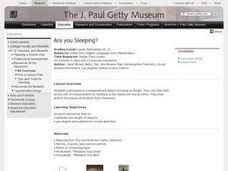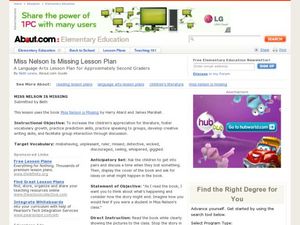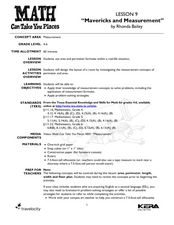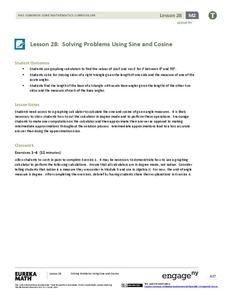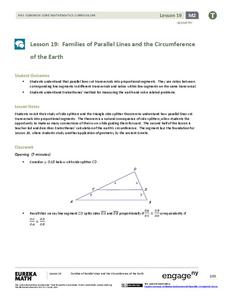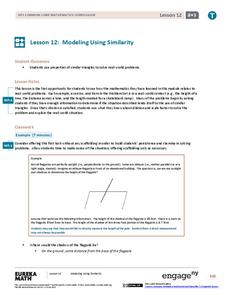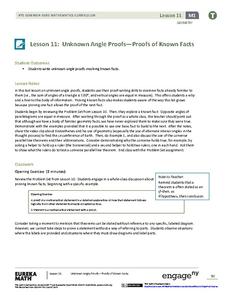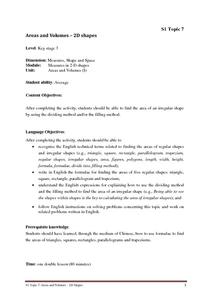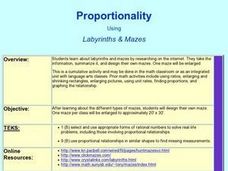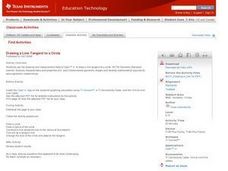Curated OER
Measurement: Lesson 3
Eighth graders investigate the concepts that are related to measurement while focusing upon weight, mass, and capacity. They estimate the weight and mass relationship that is found in different problems. Students compare and contrast one...
Curated OER
Oodles of Noodles
Students investigate non-standard and standard measurement including inches and centimeters. They use different types of noodles as non-standard units of measurement comparing them to inches and centimeters.
Curated OER
Measurement: Cylinders
Math scholars observe and demonstrate how to calculate the surface area and volume of cylinders. They analyze pictures of various cylinders on a handout, solve problems on two worksheets independently, and discuss the answers to the...
Curated OER
Are You Sleeping?
Here is a measurement lesson focusing on length. Learners use their feet as the unit of measurement for furniture in the classroom and at home, and sketch the pieces of furniture they measured.
PBS
Surface Area and Volume
You and your class will like this lesson on using visual models to relate the volume and surface area of solid shapes. Learners construct three-dimensional forms using nets. They calculate the surface area and volume for each and then...
Curated OER
Miss Nelson is Missing Lesson Plan
Second graders listen to the story Miss Nelson is Missing by Harry Allard and James Marshall. In this literature lesson plan, 2nd graders predict the story's ending with drawings and discussions within groups.
Curated OER
Mavericks and Measurement
Students study the measurement formulas for area and perimeter in real-life situations. For this area and perimeter lesson, students design a bed and arrange furniture in a hotel room using area and perimeter formulas for a 7 1/2 foot...
Curated OER
Stadiums in America
Let's play ball! A great springtime activity to learn about ratios. This activity challenges learners to draw stadiums to scale on standard letter paper and also on construction paper. This three-day instructional activity includes a...
EngageNY
Secant Angle Theorem, Exterior Case
It doesn't matter whether secant lines intersect inside or outside the circle, right? Scholars extend concepts from the previous lesson to investigate angles created by secant lines that intersect at a point exterior to the circle....
EngageNY
Solving Problems Using Sine and Cosine
Concepts are only valuable if they are applicable. An informative resource uses concepts developed in lessons 26 and 27 in a 36-part series. Scholars write equations and solve for missing side lengths for given right triangles. When...
EngageNY
Families of Parallel Lines and the Circumference of the Earth
How do you fit a tape measure around the Earth? No need if you know a little geometry! Pupils begin by extending their understanding of the Side Splitter Theorem to a transversal cut by parallel lines. Once they identify the proportional...
EngageNY
Modeling Using Similarity
How do you find the lengths of items that cannot be directly measured? The 13th installment in a series of 16 has pupils use the similarity content learned in an earlier resource to solve real-world problems. Class members determine...
August House
The Clever Monkey Rides Again
Use a West African folktale to practice several different skills in your first grade classroom. Learners read The Clever Monkey Rides Again and focus on rhyming words, reading comprehension, measurement, art, movement, and word order.
EngageNY
Unknown Angle Proofs—Proofs of Known Facts
Lead the class in a Greek history lesson with a geometric twist. Pupils relate a short video about geometric properties to modern-day methods of solving for unknown angles. They discuss parallel line theorems and complete practice...
Government of Hong Kong
Areas and Volumes - 2D Shapes
Unfortunately for young mathematicians, the world isn't made entirely of parallelograms, triangles, and trapezoids. After first learning the area formulas for these common shapes, students apply this new knowledge to determine the area...
Curated OER
Proportionality Using Labyrinths and Mazes
Conduct research on the Internet about labyrinths and mazes to learn about proportions and ratios. Inquisitive minds design their own maze, one maze is chosen and proportionately enlarged to 20 feet by 30 feet. This is a fun challenge...
Curated OER
An Introduction To Volume
Upper graders explore the topic of volume. In this math lesson plan, pupils count volume in cubic units, multiply to find volume, estimate volume, write a multiplication sentence to find the volume, and make a cost analysis of different...
Beyond Benign
Ecological Footprint
How does your lifestyle measure up in terms of your ecological footprint? Young ecologists examine their impact on the planet using an insightful online calculator. A short quiz asks users to rank the size of their homes, their energy...
EngageNY
Arcs and Chords
You've investigated relationships between chords, radii, and diameters—now it's time for arcs. Learners investigate relationships between arcs and chords. Learners then prove that congruent chords have congruent arcs, congruent arcs have...
Texas Instruments
Drawing a Line Tangent to a Circle
Explore lines tangent to a circle. In this math lesson, high schoolers manipulate circles and lines on a TI calculator. They draw a circle and analyze perpendicular lines intersecting the circle in only one place. This activity works...
West Contra Costa Unified School District
Correlation and Line of Best Fit
Computers are useful for more than just surfing the Internet. Pupils first investigate scatter plots and estimate correlation coefficients. Next, they use Microsoft Excel to create scatter plots and determine correlation coefficients and...
Baylor College
Do Plants Need Light?
Turn your classroom into a greenhouse with a lesson plan on plant growth. First, investigate the different parts of seeds, identifying the seed coat, cotyledon, and embryo. Then plant the seeds and watch them grow! Measure the new plants...
Curated OER
Relations and Graphs
Here is a simple, yet clever lesson on how to teach the important concepts of greater than, less than, and equal to. Pupils write their names down on grid paper - one letter per box. They compare their names and find a name that is...
Fraction Bars
Quotients of Whole Numbers that Equal Fractions
A complete lesson on dividing whole numbers by other whole numbers and getting a fraction result. Groups of learners use fractions bars, and strips of paper that are cut to specific lengths. The hands-on activities in the lesson are...





